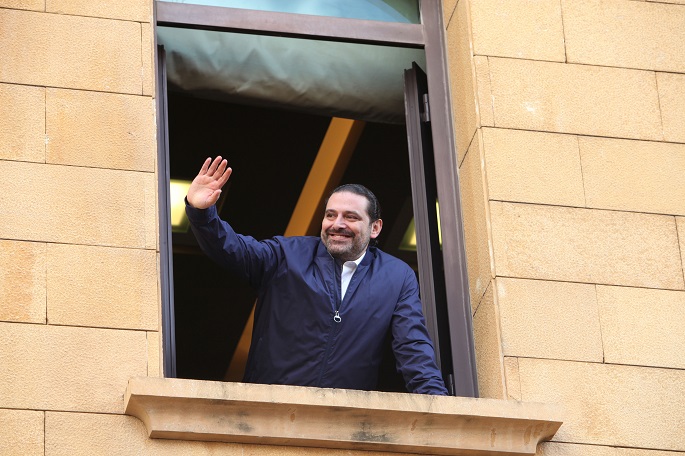Hariri's delayed resignation offers political stability chance
Published : 26 Nov 2017, 00:08

Lebanese Prime Minister Saad Hariri's decision on Wednesday to postpone his resignation has provided Lebanon with the chance to maintain political stability, analysts said.
They cited that Hezbollah has shown pragmatism and could even make certain compromise for the sake of maintaining Lebanon's political unity.
When Saudi TV news channel Al-Arabiya broadcast a recording of Hariri announcing, in Riyadh on Nov. 4, his decision to step down as prime minister, Lebanon's one-year-old government was once again plunged into uncertainty.
A year prior, on Oct. 31, Michel Aoun was elected Lebanon's president, officially ending two and a half years of presidential vacuum and political stagnation. The new government established by Hezbollah-backed Aoun and the Saudi-tied Hariri promised to maintain a "national accord," and de-escalate the political rivalries halting advancements in the country.
Hariri's resignation announcement three weeks ago was a strong departure from his repeated promises to maintain political unity. His aggressive rhetoric calling for Iran and Hezbollah to step away from regional affairs stirred up widespread rumors that Saudi Arabia had written the speech and forced the prime minister's resignation.
Despite the unpredicted move, Lebanon's government responded with overwhelming calls for peace and unity in uncertain times.
In the first of three speeches following the resignation, Hezbollah chief Sayyed Hassan Nasrallah urged for nationwide "calm and patience until things are clear." Assuring listeners that "there is nothing to fear," Nasrallah's tone diverged considerably from routine rallying cries.
Analysts thus speculate that Hariri's announcement Wednesday to postpone his resignation has opened an avenue to maintaining internal stability.
"The next few months are going to be quite delicate for Prime Minister Hariri because he's going to have to maintain consensus with the other Lebanese parties," Karim Bitar, director of research at the French Institute for International and Strategic Affairs, told Xinhua.
"Hariri is still the official head of the national unity government in Lebanon, which includes Hezbollah. Simultaneously, he will have to make sure that Saudi Arabia's strategic interests are taken care of," Bitar added.
In a televised interview filmed in Riyadh a week after his resignation announcement, Hariri indicated that he would possibly rescind his resignation if Hezbollah agreed to stay out of regional affairs, specifically in the conflict in Yemen.
"There is a Lebanese group that is carrying out certain actions," Hariri said, referring to Hezbollah, during the interview with Lebanese channel Future TV. "I will not allow for anyone to launch regional wars on Lebanon for regional gains."
Yemen remains a vital interest for Saudi Arabia in asserting the Sunni authority over the growing Shiite sphere of influence in the region, as tensions ramp up between Riyadh and Tehran.
Bitar attested to the likelihood that Hezbollah would make "minor concessions" in regards to Yemen, but dismissed allegations that the Lebanese group and Iran were strongly backing Yemen's Houthi rebels.
Calling the Houthis' insurgence a "mostly Yemini phenomenon," he noted that the link between the Yemeni armed group and Iran were by no means comparable to the historic ties between Hezbollah and Iran.
"So to be honest, I don't think Hezbollah is about to make major concessions, but they might show some pragmatism," Bitar concluded.
Sami Nader, director of the Levant Institute for Strategic Affairs in Lebanon, expressed hope that Hezbollah would indeed make a sacrifice for Lebanon's political unity.
"The government will be up and running, but it will take some time," Nader said. "After Hassan Nasrallah's latest speech, we feel that Hezbollah has paved the way for a compromise, because he said he would not be involved in Yemen, Kuwait and Bahrain."
According to Nader, only Hezbollah's commitment to making the concessions would make Hariri withdraw his resignation, serving as proof that his "demands had been taken into consideration."
Without these concessions, Hariri will not be able to maintain his position as prime minister, he opined.
"If Hariri gets back into government without any commitment from Hezbollah, the relationship with Saudi Arabia will turn sour. But escalation at this level would be against Lebanese interest," the Lebanese expert noted.
Nader, also an economist, warned that a "Qatar-style" economic blockade was also likely if the situation were to escalate.
Despite the major role of Saudi Arabia and Iran, international actors such as France and Egypt have also involved themselves to ensure continued stability in Lebanon, and to prevent further destabilization in the region.
Halim Shebaya, a political analyst based in Beirut, underlined this international support as a key aspect in keeping the Lebanese government together.
"There is a cautious optimism in Lebanon with regards to reports of a French-Egyptian initiative that would 'save' the presidential settlement or the Aoun-Hariri rapprochement," Shebaya told Xinhua.
However, like Nader and Bitar, Shebaya noted that the ultimate key to internal peace rested in the hands of Hezbollah.
While all three analysts foresaw internal concessions and negotiations, London-based analyst Kareem Chehayeb said this political fiasco could function as a reminder of Lebanon's fragile state.
"If you look at the last president, Michel Sleiman, he was brought in as a neutral figure, whereas (Speaker Nabih) Berri was pro-Hezbollah. There was (former Prime Minister) Mikati who was pro-Saudi Arabia. This balance is what Lebanon relies on, so it can remain neutral," Chehayeb said.
"Of course, this is very fragile, so every now and then we will see this fragility exposed," he added.
Negotiations will indeed take place, but what they will look like remains to be seen.

